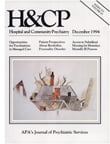Clinical and Treatment Correlates of Access to Section 8 Certificates for Homeless Mentally Ill Persons
Abstract
Objective: The study assessed how clients' housing preference and other variables were related to the acquisition of Section 8 certificates, facilitating independent living, for homeless persons with severe mental illness who were being served by an experimental assertive community treatment team. Methods: For 77 clients, demographic and clinical differences between receivers and nonreceivers of certificates were examined, and correlates of time from referral to the team to completion of the Section 8 application were analyzed. Reasons clients did not receive certificates and housing outcomes were summarized in relation to client preference. Results: The 34 clients who received certificates (44 percent) had significantly less psychopathology after three months than did nonreceivers and tended to have affective disorders rather than schizophrenia. Of the 43 nonreceivers, the two largest groups were 19 clients who did not want certificates and ten clients who wanted certificates but whom staff considered unable to live safely in an unsupervised apartment. The mean±SD length of time for application for a certificate was 5.7±5.8 months. Longer time to apply was significantly associated with having schizophrenia, having the team as a representative payee, and showing increased psychotic symptoms at referral and at three months. Conclusions: The study suggests that it is possible to honor the housing preferences of the majority of homeless persons with severe mental illness if adequate resources are provided. However, staff may view persons who have schizophrenia and more symptoms as needing more supervision than those clients prefer. Homeless mentally ill persons may also take longer than more symptomatic persons to pursue independent living through a Section 8 certificate.
Access content
To read the fulltext, please use one of the options below to sign in or purchase access.- Personal login
- Institutional Login
- Sign in via OpenAthens
- Register for access
-
Please login/register if you wish to pair your device and check access availability.
Not a subscriber?
PsychiatryOnline subscription options offer access to the DSM-5 library, books, journals, CME, and patient resources. This all-in-one virtual library provides psychiatrists and mental health professionals with key resources for diagnosis, treatment, research, and professional development.
Need more help? PsychiatryOnline Customer Service may be reached by emailing [email protected] or by calling 800-368-5777 (in the U.S.) or 703-907-7322 (outside the U.S.).



